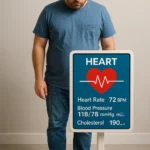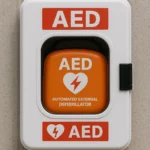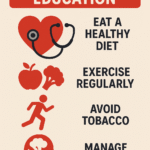
Data-Driven Health Insights for Stronger Communities
Introduction to Data-Driven Health Insights
The healthcare industry, being data-driven, has adopted numerous innovations that increase the quality of healthcare services and promote community health outcomes through better health data analytics.
Why This Matters Today
In a world flooded with all kinds of data, the proper use of data is vital for the following:
- Personalized Care: Adapting an open-source model to treat individual communities’ needs.
- Resource Optimization: Ensuring that health systems work efficiently and can be easily repaired in an emergency.
- Preventative Strategy Development: Studying out-of-the-ordinary medical cases and preempting them by solving problems naturally through applying technology.
Relevance for Patients, Researchers, and Providers
- Empowers Patients: Data helps clients to be aware of their options and thus make healthy choices.
- Accelerates Research: Scientific norms are challenged, and new knowledge is gained from the development patterns that did not exist before.
- Enhances Provider Efficiency: Technology does away with bureaucratic processes; thus, nearly the care is reported.
- Accordingly, data-driven insights are not fleeting fads but have become pivotal in cultivating the well-being of the community and benefiting individuals as well.
Historical Context of Data-Driven Health Insights
In the current healthcare industry, data-driven health insights are emerging as a very efficient transformation tool.
Evolution in Healthcare
- Technology meets Medicine: The inter-accessibility of health systems gave healthcare data analytics healthcare data analytics a massive push after the new millennium and its first decades.
- Growth of Big Data: The online transition of medical records created a vast pool of data that, in turn, would enable more insightful medical care decisions.
Impact on Medicine and Public Health
- Enhanced Decision-Making: Healthcare providers can now design treatments per precise patient info.
- Preventive Care: Using real-time data, communities can discover health trends on time and treat them before they spread.
- “data” is more than just numbers; it’s as good as a ticket to a healthier life.
Current Landscape of Data-Driven Health Insights
Key Highlights
- Rapid Growth: Digital healthcare technologies, mainly AI, are expected to double by 2025, activities that will also use AI in the future.
- Patient Empowerment: Personal fitness monitoring through wearables, health monitoring apps, and patient education activities leads to a mind shift from illness to wellness.
Noteworthy Innovations
- Predictive Analytics: These tools also examine city life and communicate with residents about the best way to implement prevention health insurance.
- Real-time Data Sharing: Innovative social justice delivers pandemic-ready patient care as physician communication channels become more efficient and healthcare providers improve their diagnosis and treatment of public health crises.
Quick Facts
- 64% of patients are now using health-tracking apps.
- Besides that, significant towns invested $100 million in their digital health information centres.
- Data-driven insights are changing the face of healthcare, making the changes in individuals’ and groups’ lives necessary for healthier years ahead.
The Impact of Data-Driven Health Insights
Patients and Families
Data-driven health insights are remodelling the way we think about health. As a result, ancestral blessings from big data are:
- Personalized therapies are treated in separate and distinct ways that suit a patient.
- Early diagnosis of diseases that help people stay alive. It should include survival rates as a local feature.
- The Ways Health Gets Better
- Health communities enjoy prosperity by having a better understanding of trends in health and translation of them on following advantages:
- Better availability of funds for the promptly required services than in the past.
- -The betterment of life through the like of one type, health programs, is the result of applying quality improvement methods and tools.
- “We feel invisible and uncared for without the data insights,” a patient expresses, recalling that the most important thing was to get this emotional support from healthcare and to include healthcare services.
In Summary
On the one hand, developing these technologies supports good health and well-being on the community and individual unit levels. Data is individuals; in addition, it is a lifesaving tool.
Impact on Healthcare Professionals and Institutions
Data analysis insights have become the driving force of the healthcare business today. Each obstacle is also at the heart of the system.
Challenges Ahead
- Training: The issue is that many health experts lack technological know-how know-how.
- Cost: Costing is another factor, as the majority of the brightest minds think that the new technologies required are not affordable.
- Integration: Sometimes, reconfiguring old structures for new techniques could be strikingly painful.
Opportunities for Improvement
However, in the face of all the difficulties, the landscape of possibilities is still there.
- Resource Management: Physicians also have a role in solving the problem of well-distributed resources and better resource use.
- Enhanced Patient Care: Customization of options with real-time feedback can be the trigger that hard-to-treat patients need to turn their lives around.
- Accepting these revelations supports the new norm and disrupts how care is provided.
Key Benefits of Data-Driven Health Insights
Revolutionizing Healthcare with Data
Applying health insights derived from data is a primary lever that will necessitate tomorrow’s healthcare.
- Enhanced Decision-Making: The analytics tool will help professionals quickly notice patterns and make accurate decisions.
- Personalized Care: Customizing treatments that entirely depend on patients’ data brings satisfaction to the patient.
- Cost Efficiency: Smoother processes will decrease waste and boost better resource utilization.
Impact on Patient Outcomes
The movement of data away from traditional records can genuinely alter the overall patient experience:
- Early Detection: Predictive analysis allows us to scan potential ailments during their initial phases in the human body.
- Health Monitoring: The ability to get information continuously supports people in making better decisions about their health.
- On the other hand, better health outcomes cannot be achieved without understanding and using data, as the health industry changes almost daily.
Challenges and Ethical Concerns in Data-Driven Health Insights
Patient Perspectives
- Privacy Risks: A patient’s health data might be the source of information that criminals use to steal their identity, resulting in a significant violation of privacy.
- Data Misinterpretation: Nonrelevant data could lead to a wrong diagnosis or a person with a minor issue might undergo critical surgery.
Researcher Perspectives
Bias in Data: Data may reveal human biases that manipulate the outcomes, thus impacting diverse groups differently
Reliance on Technology: Emphasis on technology can mean a lack of innovation in cases where human experts are crucial to decision-making.
Regulator Perspectives
- Regulatory Gaps: When the law tries to catch up with technology, it lacks precision in overseeing the wrongdoings.
- Accountability Issues: Unclearness regarding who is responsible for data errors could threaten the public’s trust in institutions.
- To be in sync with health data, we should be ahead of the times and consider ethical aspects in the decision-making process throughout the development cycle.
Embracing Data-Driven Health Insights
Get Started with Smart Tools
Immerse yourself in data-driven health insights to make responsible choices for your community. Here are some recommendations:
- Use Apps for Health Tracking: You can find apps that help you track steps, sleep, and food. By gaining insights, you can make a positive impact.
- Participate in Community Surveys: Participate in surveys that collect data about the health status in your neighbourhood. Your opinion will shape health services.
- Engage in Health Challenges: Form health challenges or join the ones based on data to encourage yourself and others to form healthy habits.
- Access Virtual Health Workshops: Join online classes that are broken down into steps, providing you with data that you can use to take action.
- Implementing these tools is advantageous to disseminating and processing critical health data in your community. It would rely on your participation to achieve real change. Little habits will inevitably shift into more considerable transformations.
The Future of Data-Driven Health Insights
The Revolutionary Impact
Medicine is approaching a data explosion transforming how communities interact with health. Check out the tools that may accurately categorize conditions and, to a high degree, accompany the patient’s journey with the proper interventions.
- Real-time health analytics and predictions to be advertised to individuals with self-managed care will significantly benefit.
- Predictive modelling, such as AI software, will identify future health problems and inform government healthcare policy decisions.
- New-fangled augmented and artificial reality-driven medical devices have been made, which can also serve as healthcare wearable equipment.
Career Opportunities
As the industry changes, new career paths are bound to show up:
- The concentration of health data analytics by data scientists is irreplaceable.
- Also, the conducting function of biotech biotech analysts is no less based on technologies that drive pathology interpretation.
- According to him, Health informaticians will use computer technology in concert with their field, resulting in a seamless merging of these two.
- However, the future is about utilizing data to facilitate informed health for some and everybody.
Why Data-Driven Health Matters
Without a data-driven perspective, today’s healthcare world will be less reliable for the public. To lead a healthy lifestyle, you must stay current in using technology as a catalyst for well-being.
Key Takeaways:
- Voice of the People: The data collected reveals the actual needs.
- Empower Decisions: You make decisions based on evidence.
- Stay Ahead: Trends are the variables we should focus on and directly affect our health.
- Don’t procrastinate! Information on how your health can be improved with the help of the data on the platform and some advice from your doctor is available at…?












Post Comment